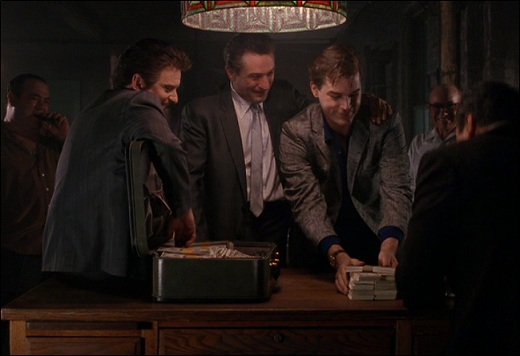Let op: bevat spoilers voor seizoen 5 – het laatste seizoen
‘Boardwalk Empire’, de serie die een 10 scoort voor productieontwerp en een drie voor emotionele impact is voorbij. Na ‘The Sopranos’ en ‘The Wire’ had HBO de vrijwel onmogelijke uitdaging een nieuw misdaaddrama te ontwerpen om de harten van serieliefhebbers wereldwijd te veroveren. Ze trokken het grootste schrijverstalent aan dat ze in huis hadden. Tim van Patten en Terence Winter verdienden beide hun sporen met ‘The Sopranos’. En Martin Scorsese ging produceren. De kaarten van ‘Boardwalk Empire’ waren meer dan uitstekend. Toch is het eindresultaat niet het ‘Once Upon a Time in Atlantic City’ geworden dat het had moeten zijn.
Tot zover het negatieve, want met een bevredigend laatste seizoen is er toch veel goeds te schrijven over het droogleggingsdrama. Alhoewel nee, er is toch nog wat te klagen. Arnold Rothstein, het beste personage uit de show (ja, Richard Harrow is ook cool), is al dood bij aanvang van de eerste aflevering van het laatste seizoen! Dat komt omdat er een sprong van zeven jaar gemaakt wordt van seizoen 4 naar seizoen 5 en de echte Rothstein in de tussenliggende periode was vermoord tijdens een pokerwedstrijd. Historisch correct dus, maar wel eeuwig zonde. Acteur Michael Stuhlbarg vertolkte Rothstein perfect. Nooit was een glimlach zo bedreigend als van A.R., zoals hij door zijn vrienden in de serie genoemd werd. Sinds zijn speech in aflevering 2 ben ik gefascineerd door hem geweest. Voor de liefhebbers:
Arnold Rothstein: ‘There was a man once – I don’t recall his name – frequented the billiard parlors downtown. He made a comfortable living wagering whether he could swallow certain objects, billiard balls being a specialty. He’d pick a ball, take it down his gullet to here, then regurgitate it back up. And one evening I decided to challenge this man to a wager. Ten thousand in cash for him to do the trick with a billiard ball of my choosing. Now, he knew I’d seen him do this a dozen times, so I can only surmise that he thought I was stupid. We laid down the cash and I handed him the cue ball. He swallowed it down. It lodged in his throat, and he choked to death on the spot. What I knew and he didn’t was that the cue ball was one-sixteenth of an inch larger than the other. Just too large to swallow. Do you know what the moral of this tale is, Mr. Yale?’
Frankie Yale: ‘Don’t eat a cue ball?’
Arnold Rothstein (smiles): ‘The moral of this story is that if I’d cause a stranger to choke to death for my own amusement, what do you think I’ll do to you if you don’t tell me who ordered you to kill Colosimo?’

Voor de historische personages is de afloop bekend, maar haalt Nucky het einde van het laatste seizoen?
Dit citaat illustreert ook meteen het beste schrijfwerk van de serie, want hoewel de recreatie van het tijdperk authentiek voelt, mist het soms de scherpte en de humor, die in HBO’s eerdere misdaad meesterwerken te vinden was. Dat lag ook aan de personages (nu gooi ik alles er maar uit). De protagonist Nucky Thompson is nogal een dode pier in de eerste seizoenen. Misschien is dat ook logisch, want gangsters als Nucky zijn nu eenmaal vrijwel gevoelloos. Toch weet het laatste seizoen middels flashbacks over Nucky’s jeugd enige kleur aan dit personage te geven. Maar wie is die verschrikkelijke acteur die de jonge Nucky gestalte geeft? En is dat een gebitsprothese in zijn mond om hem meer op Steve Buscemi te laten lijken? Daar zal de goede ouwe Steve wel om gelachen hebben.
Als maffiakenner wist ik natuurlijk al hoe het historisch correcte ‘Boardwalk Empire’ zou aflopen. Tenminste met de echte personages, zoals Al Capone, Charles ‘Lucky’ Luciano, Meyer Lanski, Salvatore Maranzano en Joe Masseria. Maar zou Nucky het einde van de serie gaan halen? En Chalky White? En Van Alden, de ex-droogleggingsagent en moordenaar die in Chicago verstopt zit? Ik vroeg me laatst af of Nucky überhaupt echt bestaan heeft. Het antwoord staat op Wikipedia (waar anders?): Nucky is loosely based on former Atlantic City political figure Enoch Lewis ‘Nucky’ Johnson.
Maar omdat het ‘gebaseerd op’ is, zegt het lot van de echte Johnson niks over het lot van de fictieve Thompson. En dat lot is uiterst toepasselijk: Thompson wordt doodgeschoten door Tommy Darmody, zoon van de door Nucky vermoorde Jimmie Darmody op het einde van seizoen 2. Er vloeit nog veel meer bloed. In aflevering 6 van het laatste seizoen leggen maar liefst twee memorabele hoofdpersonages het loodje: Van Alden en Chalky White. En het er wordt daarmee eindelijk – zeker met de dood van laatstgenoemde – ingespeeld op het gevoel van de kijker.
Het gangstergeweld in seizoen 5 doet ook denken aan de verbeten strijd tussen HBO en het steeds machtiger wordende Netflix. Geen goede overwinning zonder vijanden, dus HBO zal de creatieve capaciteiten moeten aanwenden om prominent op het toneel te blijven. Ze hebben sinds ‘The Sopranos’ begon in 1999 een gouden decennium beleefd, maar lijken nu net niet die draai terug te kunnen vinden. Het ambitieuze vlaggenschip ‘Game of Thrones’ nadert ook een climax, en met ‘Boardwalk Empire’ ten einde is er op misdaadvlak ook nog geen opvolger in zicht. Ik wacht in spanning af met een herkijk van HBO’s excellente ‘In Treatment’ op het programma.











